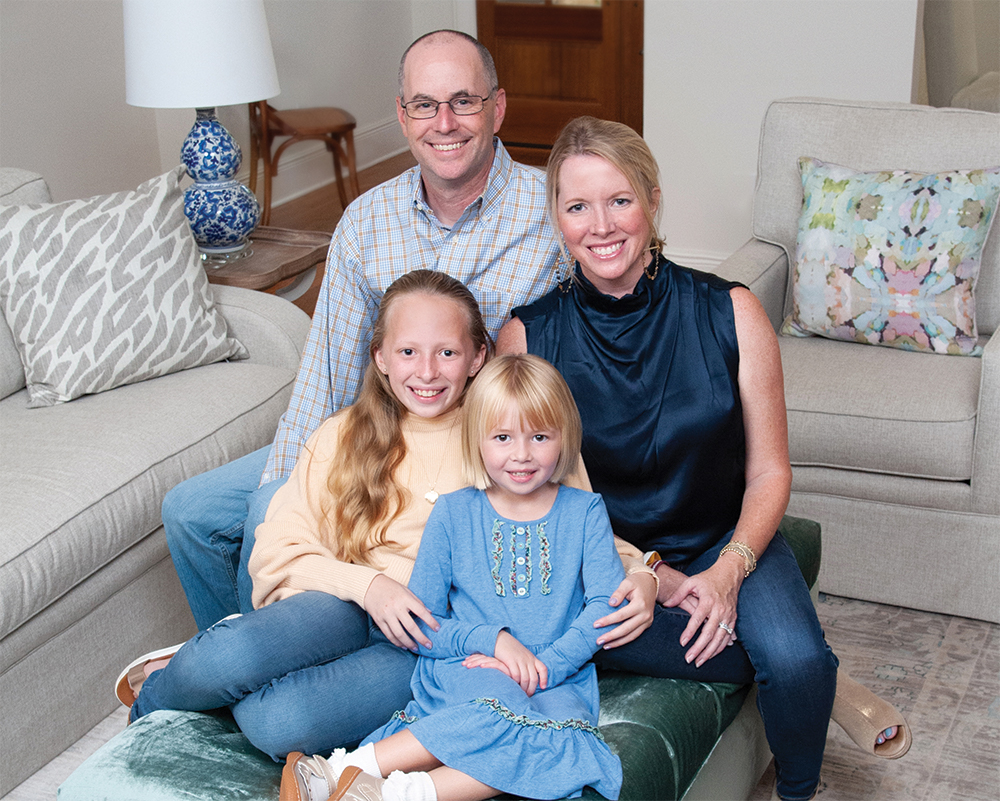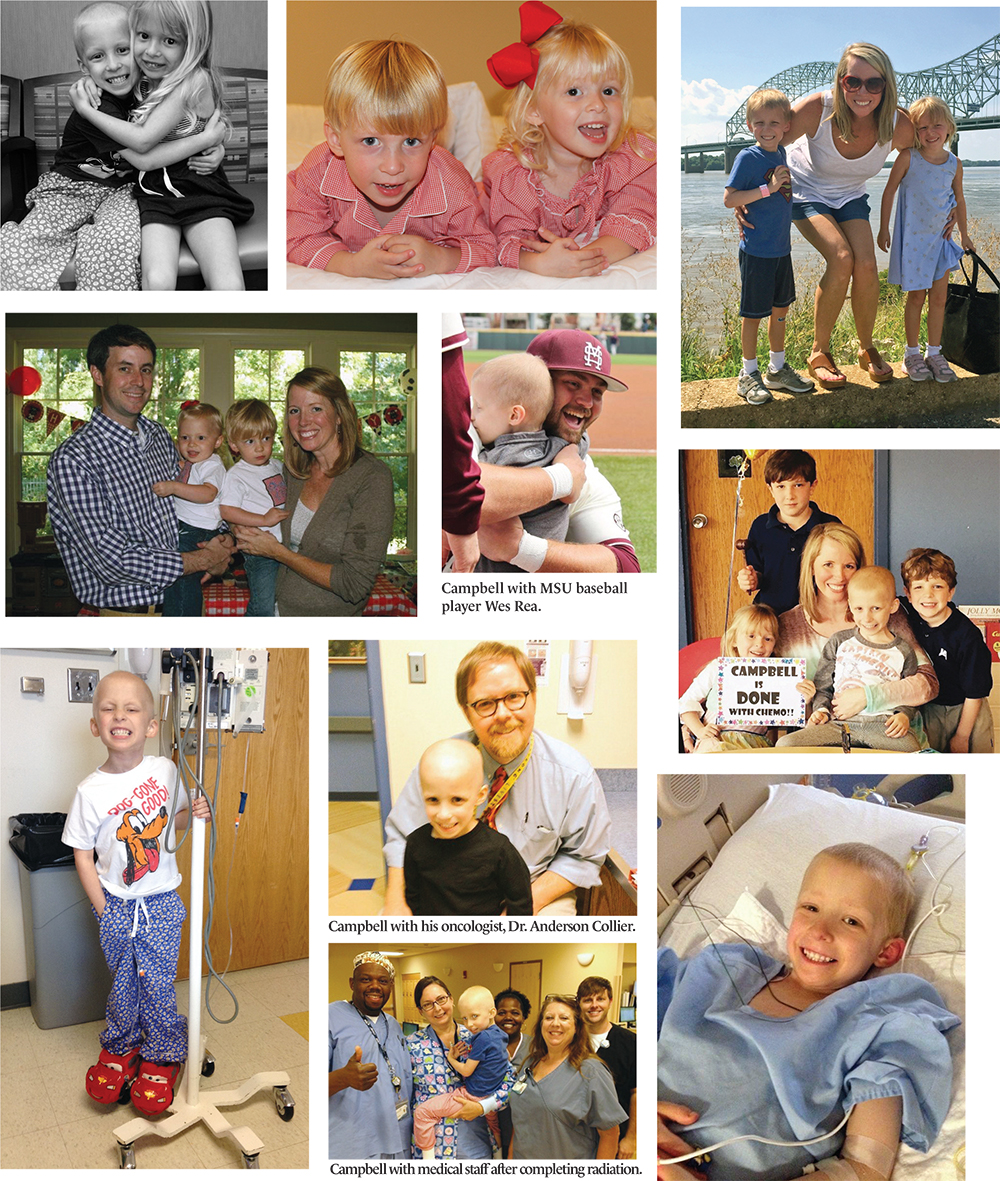By KATIE EUBANKS
Every September, 12-year-old Avery Dale picks out a birthday cake for a team of nurses at Batson Children’s Hospital in Jackson. The “3C nurses,” as Avery’s mother Jill calls them, took care of Avery’s twin brother, Campbell, during his bout with cancer in 2014 and 2015.
“We’ve always kind of let (Avery) lead us in how she wants to honor him,” Jill says.
“Campbell touched more people in five years than I ever will,” says his father, David Dale.
And Campbell still hasn’t stopped impacting others, even six years after going home to Jesus.
The diagnosis and small graces
Jill and David, both Jackson natives, suffered a miscarriage and struggled to conceive before having twins Avery and Campbell in September 2009. They were born nearly two months early and spent three weeks in the neonatal intensive care unit (NICU).
After that, things looked rosy.
“They thrived at home, they were best friends, they loved each other,” Jill says. “They had their own language. Half the time, we didn’t know what they were saying.” They were so healthy, they didn’t even get ear infections.
Then in February 2014, when the twins were about 4 and a half, the Dales noticed a bulge on Campbell’s abdomen. The bulge wasn’t that noticeable, so they just kept an eye on it over the weekend.
Early the next week, Campbell got upset and cried when trying to use the bathroom. The bulge got more noticeable. Jill and David took him to the doctor, and a CT scan revealed a mass in his abdomen.
“(Someone said) ‘I’ve already called Batson. They’re waiting on you. Go now,’” David recalls. “The world started spinning. We were calling people to get Avery, calling family.”
That Thursday at Batson, in a crowded conference room, doctors told the Dales, “We don’t know what it is, but we’ve got to get it.”
Campbell’s first surgery happened that Friday. By the time he left the hospital, he’d been diagnosed with stage 4 rhabdomyosarcoma, which has a less than 30 percent survival rate. Doctors gave him a chemo port, and gave his parents a 3-inch-thick binder describing the chemo protocol they’d be following for the next year-plus.
“My thought from day one was, he’s going to be healed — whether here or in heaven,” David says.
Jill’s mentor’s daughter had survived rhabdo years earlier. She was part of that 30 percent. Campbell could be part of that 30 percent too.
After coming home from the hospital, Campbell was “back to normal, riding his bike, playing with Avery,” Jill says. “We look back now, and God was in every part of that.”
In fact, over the next year and a half, God would show up countless times. For instance, David had seen a man in the elevator at Batson who looked familiar.
“It was the guy who married us,” David says. “He was Jill’s youth pastor.”
Also, the nurse anesthetist for the surgery turned out to be one of the Dales’ neighbors. From then on, “if she wasn’t there, her friend was there to take care of (Campbell),” Jill says.
“We knew that God was with us every step of the way.”
That was an assurance they desperately needed.
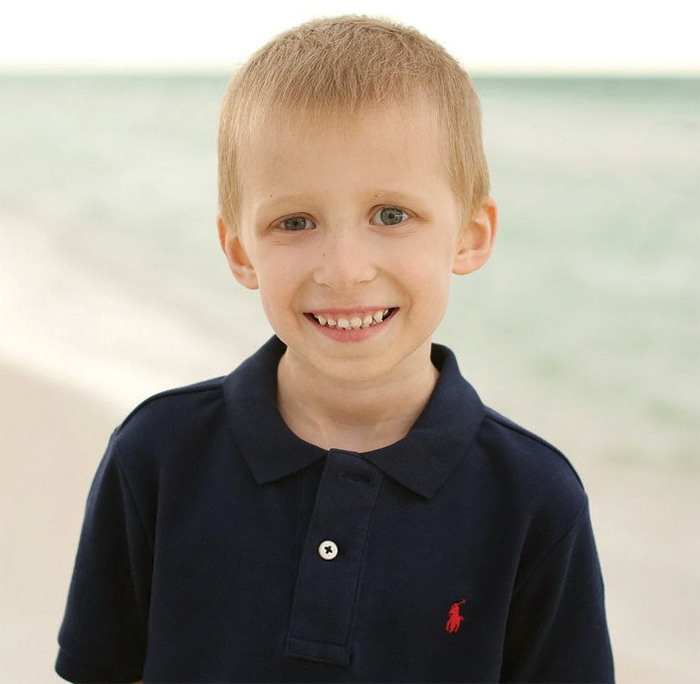
“He just had this light about him,” Jill Dale said of her son, Campbell.
Chemo, inflatables and gratitude
In their minds, Jill and David thought, “We’re going to beat this.”
“You have to (think that way). You’re your child’s advocate,” Jill says.
In addition to the chemo, every day for 24 days, Campbell was sedated for full abdominal radiation. He never asked questions — about any of it.
“We told him, ‘You’ve got some bo-bo’s on the inside and the doctors are going to take care of it,’” David recalls.
Eventually, “he was so used to the hospital and the people, they had this special relationship,” Jill says. “Campbell’s quirky, and (his oncologist, Dr. Anderson Collier) knew that. He knew what Campbell could handle (each) day.”
After radiation, Campbell was back home — with a radiation “suntan” on his abdomen — and being his normal quirky self. For instance, he was a little OCD and liked things organized. He also had started speech therapy when he got sick.
“He couldn’t say the word ‘sister,’” David says, so Campbell called Avery “Shoo.”
“I called him ‘Boy,’” Avery adds.
After being diagnosed in February 2014, Campbell didn’t slow down till November. Then he started having trouble urinating, David says.
“The radiation had basically fried his bladder. He eventually was screaming because he couldn’t go.”
Doctors gave him stents to help temporarily, but focused on getting him through chemo before fixing the problem for good.
Every six weeks, his scans came back clear.
“He once again rocked along,” Jill says.
That fall, the Dales went big for the holidays. “We had Halloween (inflatable) blow-ups, we had Christmas blow-ups,” Jill says — all chosen by the twins.
“We always said each day we would be thankful that God woke us up and that we could breathe another breath.”
Riding IV poles
In April 2015, Campbell got to ring the bell at Batson. He’d finished chemo.
Then the Monday after Easter, Dr. Collier called. Campbell’s final scans showed a tiny new spot that had to be removed.
“We came in to have surgery, and they said, ‘Not today. We need to have the cardiovascular doctor here,’” David says. “So we went to New Orleans that weekend.”
“We knew if we went into lockdown again with him being immunocompromised (after surgery), we might not get another chance,” Jill explains.
Meanwhile, she and David had found out she was pregnant. But before they could go in for Campbell’s surgery, she suffered another miscarriage. Campbell’s ultrasound happened the day after her D&C. “I don’t even know how I did it,” she says.
At the end of April 2015, Campbell had his second surgery. Afterward, the Dales had four options: Bring back the drug that had hurt his bladder; try a treatment that had been used on breast cancer, since both it and rhabdo were sarcomas; see if St. Jude Children’s Research Hospital in Memphis had a clinical trial open; or take him home.
“We weren’t ready for that (last option),” Jill says.
“He wasn’t either,” David adds.
They chose the first option and took Campbell to Batson for chemo infusions once a week for six weeks.
Avery’s earliest memories are of being at the hospital with her brother.
“When he would have to stay in the hospital at night, I would stay on the red foldout, and we would ride the IV poles (down the hall),” she says.
Avery remembers waiting for the hospital playroom to open; getting her and Campbell’s picture made while being hoisted up in the air by football players; and never thinking twice about going straight to the hospital after school.
“Even when he came home from the hospital, we’d sleep in the same room,” she says. Shoo and Boy were inseparable.
M&Ms and a Delta rainbow
After the six-week treatment, Campbell’s reports came back. Dr. Collier was out, but Jill couldn’t wait: She called the nurse.
“(The nurse) started reading off all the new spots, and I said, ‘Wait, I’ve got to write,’” Jill says. She’d been filling a red notebook with prayers, moments from her quiet times with God, and other details of Campbell’s journey.
Both of Campbell’s initial spots had returned, and he had more spots on his lungs and back.
“I called David, he came home, and we just cried,” Jill says.
Even then, David says, “We couldn’t give up, because he felt so well. He was still doing laps through the house. But I knew in my heart … this was not going to be good.”
The Dales decided to apply for a clinical trial at St. Jude. It could buy Campbell some time.
“God was conforming our desires to His,” Jill says. “We went from, ‘Heal him on Earth,’ to ‘God, not my will but Yours.’”
Jill’s sister-in-law’s friend was a nurse practitioner for one of the leading sarcoma doctors at St. Jude. Another small grace. Jill called the man in charge of scheduling, sent him Campbell’s information on a tight deadline — and Campbell was accepted for the clinical trial.
“We had prayed, ‘God, show us what to do and when to stop. Shut the doors You don’t want us to go through.’” This door was open.
St. Jude staff asked, “Can Campbell swallow a pill?” The Dales said yes — then started training Campbell on how to swallow a pill. They used M&M Minis. He never graduated to regular M&Ms, so Jill and David were a little concerned.
In Memphis, when Campbell was given his first capsule, “he drank some water, swallowed (the pill), and said, ‘Where’s my iPad?’” Jill recalls. He was totally unfazed. Another small (big) grace.
Campbell went back to St. Jude regularly for checkups, and experienced no ill side effects from treatment.
The weekend before the twins were to start school, the Dales noticed another bulge on Campbell’s abdomen.
“You try to ignore it,” Jill says. “But by now you know what it looks like.”
They wound up spending nine hours in the emergency room, with Campbell in pain. Eventually, the 5-year-old boy looked at one of the doctors and said, “‘Don’t just stand there. Get me something (for the pain),’” David recalls. “I busted out laughing.”
“He was such a funny kid,” Jill says.
The next morning, the Dales flew back to St. Jude, thanks to a friend of David’s who had a plane.
“We thought we’d be (at St. Jude) for a couple weeks,” David says. “Jill took Campbell to the bathroom, and Dr. Frederico looked at me and said, ‘I’m so sorry. There’s nothing else (we can do).’”
On the flight home, in the midst of one of the worst moments of their lives, the Dales received another sign from the God who’d never left them: a rainbow, right in the middle of the Mississippi Delta.
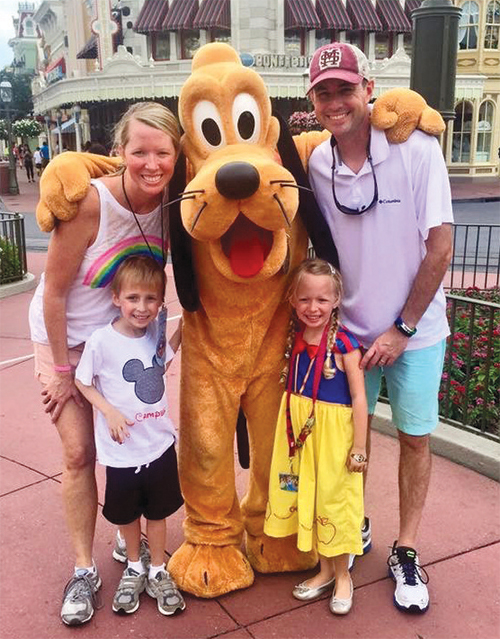
Meeting Pluto at Disney World.
Ready to go home
Jill and David focused on making Campbell as comfortable and happy as possible. He underwent 10 days of radiation to take away the pain, David says.
They had a Make-A-Wish party at The Country Club of Jackson, and hundreds of people came, including strangers who were praying for Campbell. “We said it was ‘Campbell’s last public appearance,’” Jill says, chuckling.
A few days later, they flew to Disney World, where Campbell got to meet his favorite character, Pluto.
“We could’ve come home (after that),” Jill says. “He’d always brought (his stuffed) Pluto to the hospital. I’ve never seen a kid smile that big.”
Avery says the upstairs of their home still contains “thousands” of her and Campbell’s stuffed animals from Disney. Well, maybe not thousands, but a lot.
On September 15, Jill’s birthday, Campbell spoke for the last time.
“He was on oxygen (at home),” Jill recalls.
“I love you,” she told him.
“I love you, Mama.”
“Are you ready to go home?”
“Yes.”
She knew he was talking about heaven.
Three days later, David had slept with Campbell downstairs. When Jill came down, David said, “Today’s the day.”
“I remember saying, ‘I’m not ready for this,’” Jill recalls. “I said, ‘I don’t want to watch my child die. Why do we have to do this? I can’t do this.’ You’re in denial and panic mode. But then you realize, it’s not by your strength alone. And God will give you what you need for each day to put one foot in front of the other.”
At 2:55 p.m. on September 18, 2015, Campbell was taken off oxygen and quietly took his final breath on this side of eternity.
One of the first verses he and Avery memorized at preschool is inscribed on his tombstone: “Let the little children come to me and do not hinder them, for to such belongs the kingdom of heaven.”
“Campbell knew we loved him,” Jill says. “But our greatest joy is that he knew God loved him.”
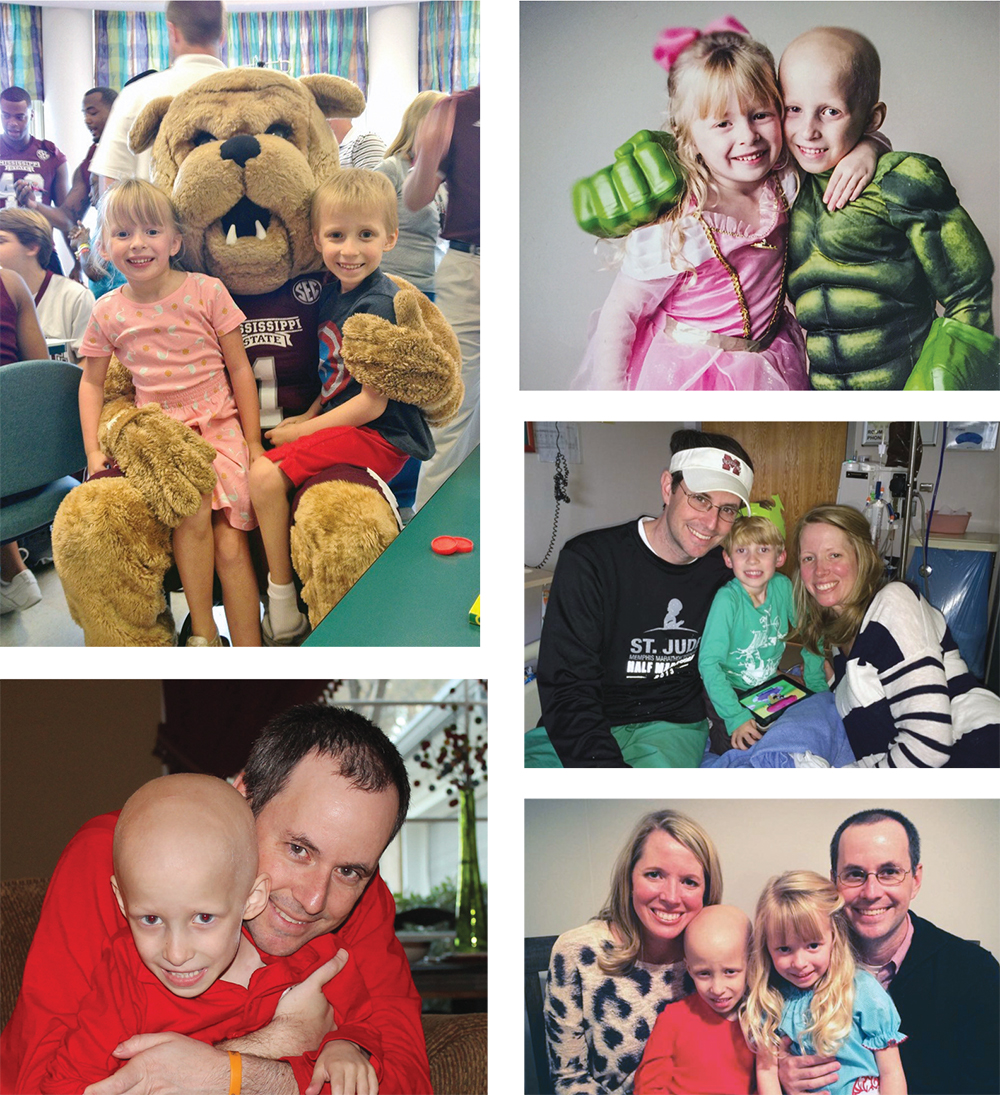
Honoring their ‘Bulldog’
Every September — before buying one birthday cake for Avery and another for Campbell’s 3C nurses — the Dales start wearing blue and gold to bring awareness to childhood cancer.
Jill knows that some parents who’ve lost children can’t get involved in “causes,” because it’s just too painful. But “we couldn’t walk away and do nothing. Because there’s another kid just like Campbell … another parent who’s been told, ‘There’s nothing we can do.’”
Also, there have been huge advancements in research and treatment for cancer in adults, but not as much for children.
“It shouldn’t be that you can give a 60-year-old five to 10 more years, but you can’t give my kid tomorrow,” Jill says.
In 2016, the Dales established the Campbell Bulldog Fund for Childhood Cancer Awareness and Research at the Community Foundation for Mississippi. They’ve raised $100,000 in five years. (See box on page 18 for Mississippi State connection.)
“One thing we tell Avery is, ‘This life is not about you, not about us. God has put you here for a purpose,’” Jill says.
Mercy and (Stella) Grace
Jill and David had never planned to have another child.
But after Campbell’s death, they thought, “If something happened to us, Avery would be all alone.” They decided that if they got pregnant again, that would be great.
When they found out in 2016 that they were expecting, Lamentations 3:22-23 came to mind: “The steadfast love of the Lord never ceases; his mercies never come to an end; they are new every morning; great is your faithfulness.”
In February 2017, “Stella Grace came along and rocked our world,” Jill says.
“You see a lot of (Campbell) in her,” David says of Stella Grace. “She likes to line stuff up, like all the chip bags in the pantry. Sometimes I look at her and think, ‘Campbell, are you in there?’”
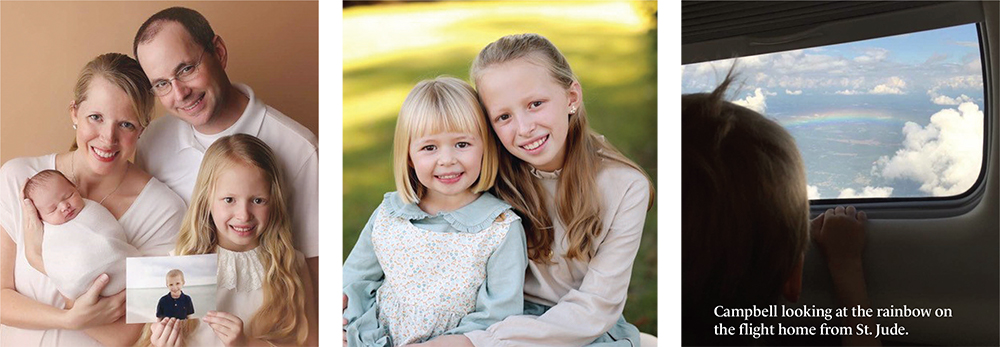
An ongoing impact
“(Campbell) doesn’t even know the impact he had on us (and others), how our life was changed, how Avery’s life has been changed forever,” Jill says.
“It was teaching us first of all to let go, because we were always the type to plan out everything. ‘My kids are going to go to this school … ’ But then it was, ‘He woke up today.’
“One thing we don’t say in our house is, ‘Life’s not fair,’” even though they know that’s true, Jill says.
They know life’s not fair, but they also know a couple of more important things, more sharply than they could’ve known eight years ago:
First, this world is not our permanent home. “There is something greater waiting (for believers),” Jill says.
In the meantime, “no matter what happens, God’s going to take care of us.”
The Campbell Bulldog Fund
During Campbell Dale’s cancer journey, he was able to meet the Mississippi State University football and baseball teams, be a “Bulldog for a Day,” and even watch cartoons in then-coach Dan Mullen’s office after undergoing radiation.
Campbell made a big impression on everyone he met, Jill says. “He just had this light about him. You were drawn to him.” That included Mullen and MSU baseball player Wes Rea, who was a pallbearer at Campbell’s funeral.
Rea is also helping organize a golf tournament happening later this month to benefit the Dales’ Campbell Bulldog Fund for pediatric cancer research. Find out more about the golf tournament and how to donate at Facebook.com/CampbellBulldog.
